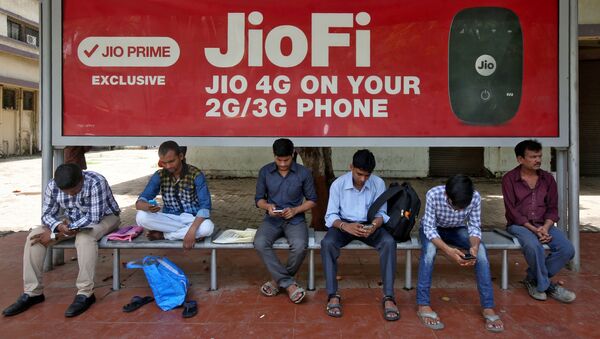Presently, both India and the US are tightening up scrutiny over the involvement of Chinese tech giants in their 5G-enabled future against the backdrop of Coronavirus and trade tensions.
Taking advantage of the situation, earlier in July, 63-year-old Indian business tycoon Mukesh Ambani announced that his telecom brand Jio was working on developing a made-in-India 5G technology to reduce dependency on foreign players.
During the event, representatives from the companies revealed that Qualcomm and Jio were able to develop a secure Radio Access Network (RAN) for this 5G working system. A RAN makes for an integral part of a 5G system as it manages radio communications between the base station and mobile devices using the high-speed internet.
— Rohit Bansal 🇮🇳 (@theRohitBansal) October 20, 2020
Qualcomm Technologies, Inc., the world’s leading wireless technology innovator and the driving force for 5G, and Jio Platforms, today announced that they are working together to develop indigenous 5G solutions and network Infrastructure for India pic.twitter.com/LjlHUfaY4h
BIG BREAKING..
— Sandeep Jain Tradeswift (@SandeepKrJainTS) October 20, 2020
Reliance Jio & Qualcomm align efforts on 5G#RelianceIndustries
Breaking news pe breaking news..
New Normal with RIL 😊👍🙏 pic.twitter.com/8dVDAdYEwm
Commenting on Jio and Qualcomm teaming up to develop an independent 5G tech and infrastructure for India, senior tech analyst Achen Jhaker said this “enormous step comes as a breath of fresh air against the monopolistic reign that China projects to have established in the area of 5G with its equipment makers like Huawei and ZTE”.
“Everyone knows about China’s habit of waging snooping wars on other countries using their front line companies. Governments all over the globe have either banned or giving serious thoughts about banning tech products and apps from China. Qualcomm and Jio’s foray in the world of 5G equipment manufacturing is a welcome step globally. For far too long everyone has struggled with monopolistic reign of China,” Jhaker told Sputnik.
Last year, snubbing the US’ constant warnings concerning national data security, India allowed Chinese tech players to participate in its 5G trials.
India was supposed to move forward with its 5G trials in the beginning of this year, but the pandemic outbreak pushed the trials to 2021.
In April, however, China entered a deadly border dispute with India in the Ladakh region. Both countries blamed each other for violating the Line of Actual Control (LAC).
In a string of “digital strikes”, India banned over 230 Chinese apps from operating in the country, citing national security reasons.

Hence, Jio’s partnership with Qualcomm in developing a 5G infrastructure for India comes as a welcomed step, the analyst said.
“India being one of the largest telecom markets in the world has a massive in-house requirement for high-speed networks and with Prime Minister Narendra Modi’s ‘Make in India’ initiative being taken seriously by everyone, this is truly a great moment. 5G system created by Jio, which is world’s third largest telecom company backed by Qualcomm’s advanced technologies will surely emerge as a great alternative to similar products in fthe market,” Jhaker added.
The news has created a buzz on social media in India, with netizens giving mixed reactions. While some say this is good news, the others say they are not so sure as yet.
Qualcomm and Jio Platforms today announced their
— Aseem Manchanda (@aseemmanchanda) October 20, 2020
expanded efforts to develop open and interoperable interface compliant architecture based 5G
solutions with a virtualized RAN. This will enable fast roll out of
indigenous 5G network infrastructure and services in India. https://t.co/pjRHJNhkxx
Good news from the Indian telecom industry:
— Varun Jhaveri (@Varun_Jhaveri) October 20, 2020
Jio has collaborated with Qualcomm, world’s leading wireless technology innovator to develop indigeneous 5G solutions & network infra for India!
1 GBPS speed achieved in trials. Very encouraging & great boost to 'Make in India'!
Ladies and gentlemen the 1 Gbps speed is only the theoretical speed. Reality is different. Speed of 4g network ranges from 18 Mbps to 122 Mbps. But I get a speed of 200-400 Kbps 😅
— SIDDHARTH (@illmatic_sid) October 20, 2020





